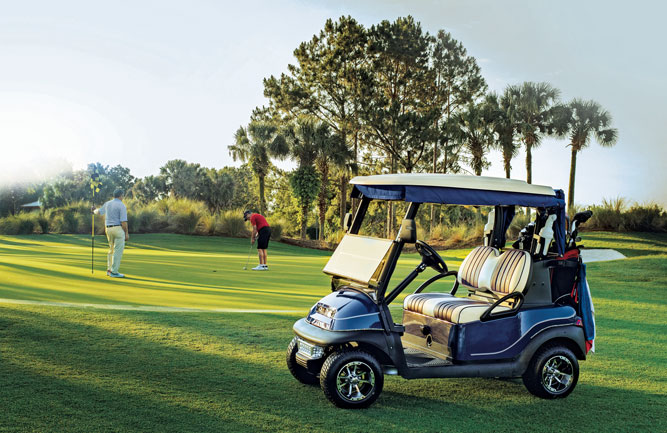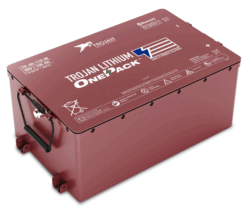What to consider when selecting lithium-ion batteries
All lithium-ion battery manufacturers claim the products are reliable, long-lasting and safe. In truth, there can be major differences in the quality of these products. These differences depend on the expertise of the manufacturer, the build quality of the battery and the availability of support services.
A young technology
Before selecting lithium-ion batteries, it’s important to understand the current state of the industry. Lithium-ion is a relatively new technology that’s taken off in the last five to 10 years. The demand for these batteries is high and continues to grow.
As a result, many startups have jumped into the arena. They may lack the engineering expertise and infrastructure needed to manufacture and service the quality products golf courses need.

Durability matters when searching for a lithium-ion battery. Ask manufacturers how the batteries handle vibrations, dust, water ingress and heat dissipation. (Photo: Trojan Battery Co.)
“Startups generally face stiff learning curves,” says Eric Lehmann, director of quality services for Trojan Battery Co. “Further, inflation and supply chain problems are hitting startups especially hard right now. That makes it important to do your due diligence, not only on the batteries but on the manufacturers themselves.”
Durability is in the details
The better the build of a battery, the greater the return on investment will be.
“First-rate manufacturers design and engineer their batteries to preempt common problems. As a result, these batteries often deliver superior performance and longer life,” Lehmann says.
Ask the manufacturer how they design batteries to handle:
⦁ Vibrations. Superintendents are well aware of the rigors golfers put golf carts through. Golfers may drive vehicles on rocky paths, over curbs and into sudden stops, which can damage or destroy the electronics in lithium-ion batteries. Most batteries will claim to be vibration resistant, but standards vary considerably.
For optimum durability, look for batteries rated to the Society of Automotive Engineers (SAE) standard SAE J3060 — the benchmark for batteries used in agricultural and construction environments. It protects the battery’s wires and components and increases its life. Many batteries do not meet this high standard.
⦁ Dust and water ingress. Dust, rain, snow and sand can also damage batteries. Look for a battery with an ingression progress rating of at least IP67. Batteries not certified to this standard are vulnerable to costly environmental damage.
⦁ Heat dissipation. Lithium-ion batteries can generate high heat. Manufacturers must move this heat away from the battery’s cells to prevent damage. Most manufacturers do this through inexpensive components called heat sinks because they are easy to make and add on. But if the battery generates high amounts of heat, the cells inside will likely age faster.
Heat sinks should not be the only method of heat management.
“Well-designed batteries reduce the heat generated and allow for natural cooling in the design. This requires more engineering expertise, but it boosts efficiency, improves safety and prolongs battery life,” Lehmann says.
Ease of use and safety
⦁ Make sure the batteries are fully drop-in and scalable. This allows crews to replace the batteries in existing cars with lithium-ion batteries and add batteries when needed to extend range.
⦁ Consider the range. The range of lithium-ion batteries varies considerably from manufacturer to manufacturer. Make sure the batteries provide the longest range possible. Real-world test data and testimonials are the best way to understand the available range of a battery. Manufacturers may base stated capacity on the sum of individual cells within the battery, which is different from usable capacity and does not account for internal losses. Check usable capacity.
⦁ Ask about UL certifications. Is the entire pack UL-certified or does the manufacturer rely solely on the cell provider’s UL listing?
⦁ Look for a battery with lithium-iron-phosphate cells, one of the most stable lithium-ion battery chemistries.

A strong partnership with a battery manufacturer is crucial, according to Eric Lehmann, director of quality services for Trojan Battery Co. (Photo: Trojan Battery Co.)
Check the Battery Management System (BMS)
Traditional lead-acid batteries require users to gather information through inefficient shunting or voltage monitoring. But lithium-ion batteries feature smart BMS that function as the battery’s brain. They allow the components to communicate with each other to protect the battery from damage, prolong its life and keep it operating within its safety limits.
These systems are not equally effective. To identify a sophisticated, high-performing system, Lehmann suggests you:
⦁ Look for a BMS with several levels of safety redundancy. “That way, if one level fails, another will step in, catch the issue, and turn the battery off, protecting you and your property,” he says.
⦁ Find a BMS that pairs the battery with an in-cab battery charge indicator. This will tell the crew the state of charge for each car, prevent stranding golfers and speed the pace of play.
⦁ Get a battery that can communicate with chargers and/or the vehicle itself via a controller area network. This level of communication maximizes the advantage of the BMS and the efficiency of a lithium-ion battery.
Chose a partner, not just a supplier
Lehmann suggests beginning a search for batteries by looking for an experienced manufacturer who has supplied batteries to major golf car OEMs.
“These companies won’t be playing catch up. They know the problems golf courses face and the issues that can damage batteries and shorten their lifespans,” Lehmann says.
Ask the manufacturers these questions:
⦁ “How long have you been making batteries for the golf industry?” Knowledge of the golf industry and the golf cart’s use is a must.
⦁ “How long have you been working with lithium-ion technology?” If the answer is just a year or two, the company probably has a lot to learn.
⦁ “What kind of customer support do you provide?” Make sure the company has a customer service line staffed by real people who can answer questions and help technicians troubleshoot issues. Ask if support is available 24 hours a day and if the staff includes representatives dedicated to lithium-ion products. Many newcomers to the market simply don’t have the infrastructure to provide this level of service.
⦁ “How do you sell your batteries?” Look for a company with an extensive distributor network that sells its products locally. Make sure distributors understand how to operate and troubleshoot the company’s batteries.
With due diligence, superintendents can avoid buyer’s remorse and properly identify high-performing, long-lasting batteries.












Stackable Integrated Battery’s most popular products in Europe in 2023
http://www.essvalley.com/stackable-integrated-battery